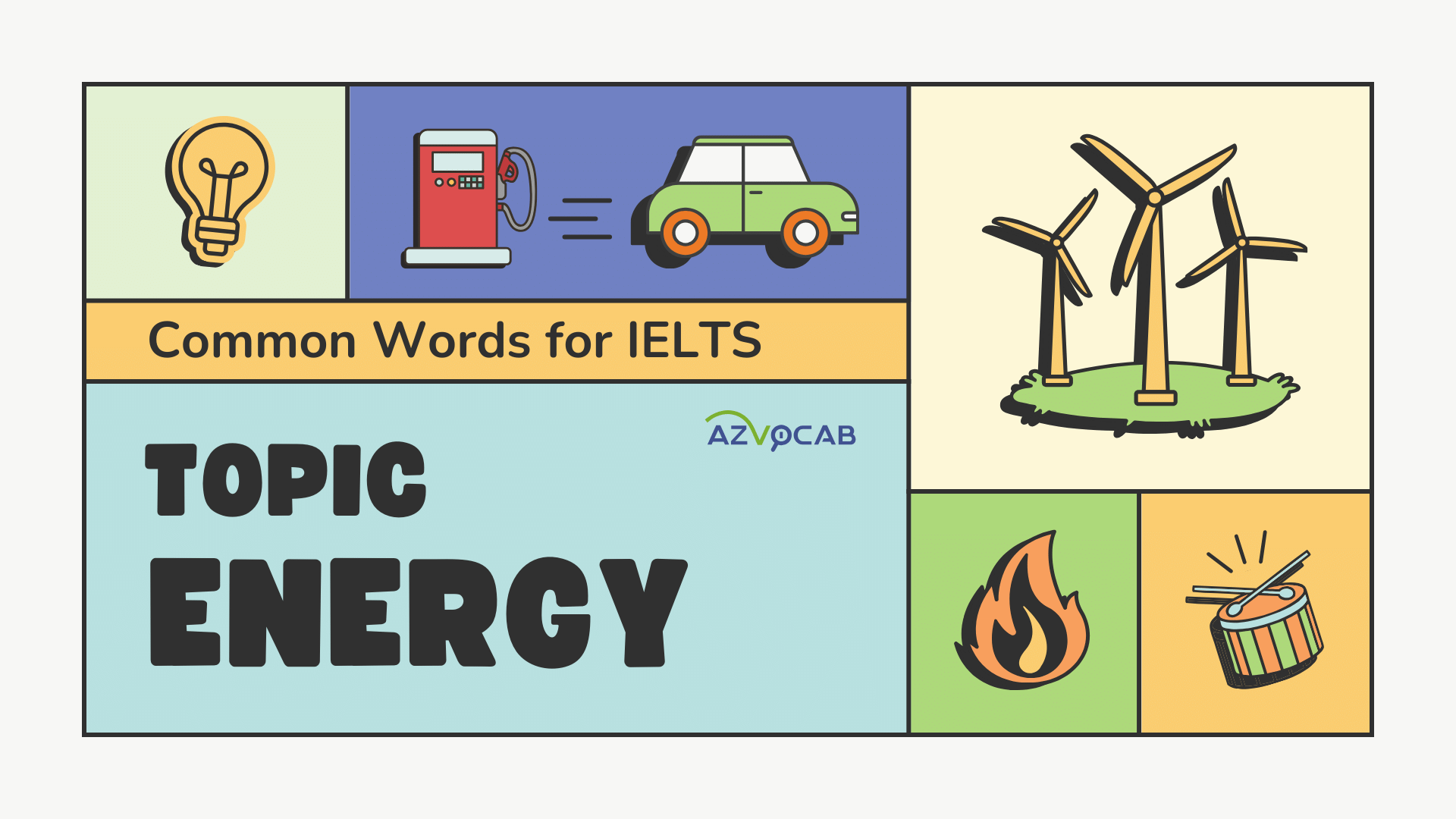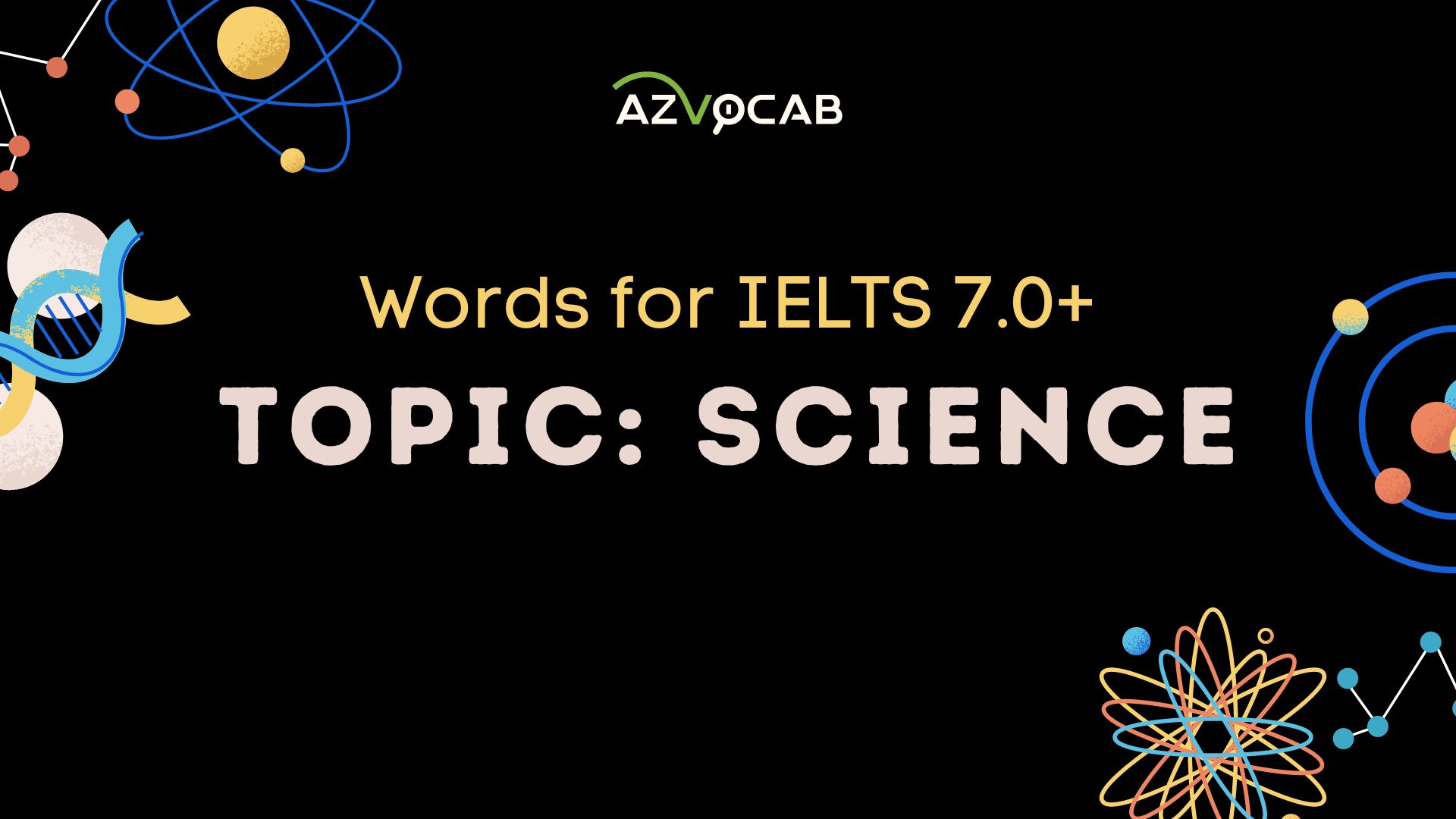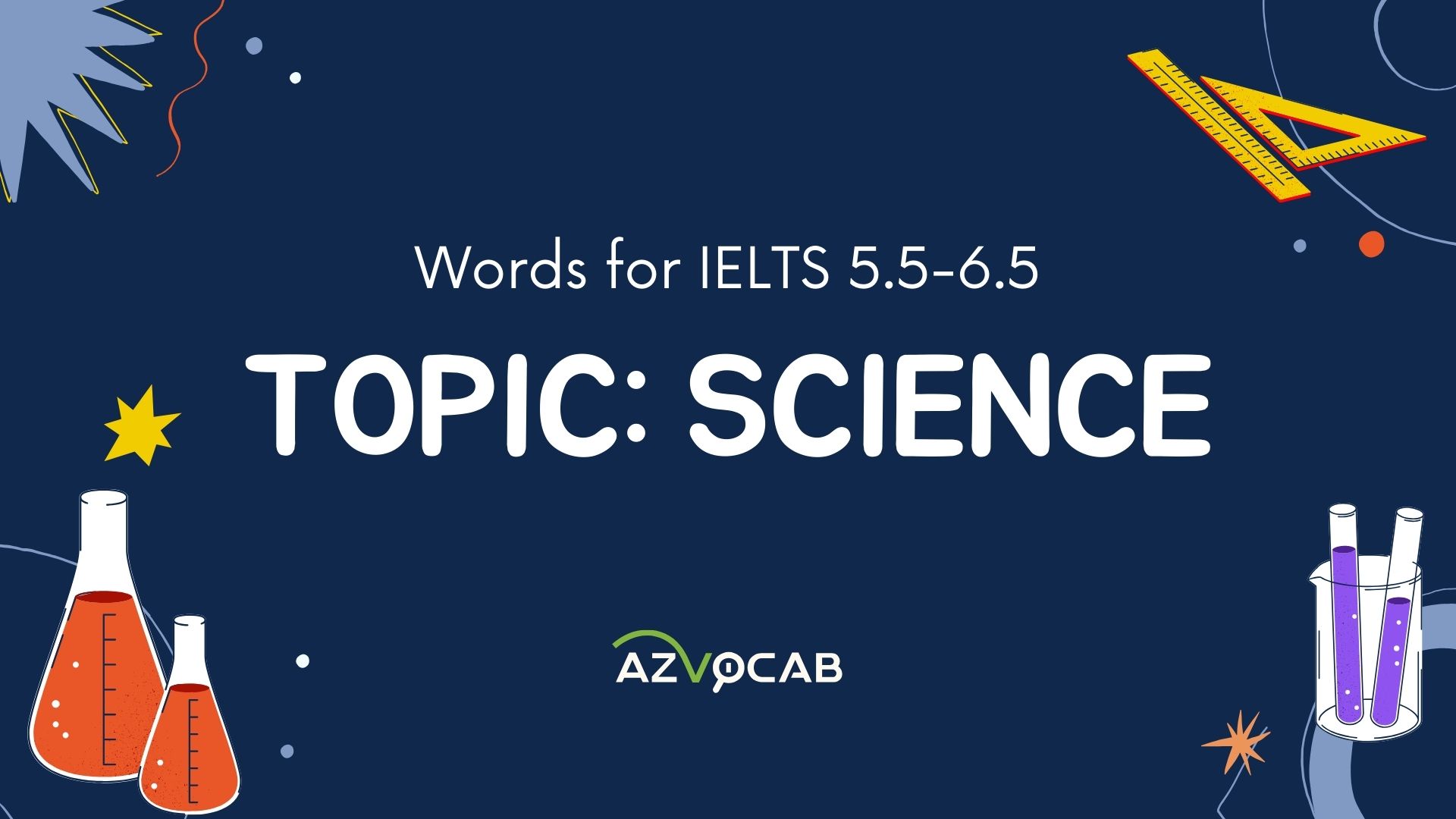azVocab has compiled over 50 common words on the topic of “Energy” for the IELTS exam. These vocabulary words can be used in all four sections of four skills: Reading, Listening, Speaking, and Writing. azVocab has carefully selected examples that fit specific contexts in IELTS exams. This will help you understand how to use these words in context, increasing the effectiveness of your vocabulary learning.
1. Vocabulary related to energy resources
| biofuel (n.) – a fuel that is made from living things or their waste | Others believe that biofuels are the future. |
| electricity (n.) – a form of energy that can be produced in several ways and that provides power to devices that create light, heat, etc. | If you own a four-wheel-drive car and replace it with a hybrid car – a car that is powered by a combination of electricity and petrol – or a smaller standard-fuel car, you can achieve a reduction of that magnitude in a day rather than half a century. |
| fossil fuel (n.) – fuels, such as gas, coal, and oil, that were formed underground from plant and animal remains millions of years ago | At the moment we are far too dependent on fossil fuels to meet our energy needs. |
| hydrogen (n.) – a chemical element that is the lightest gas, has no colour, taste, or smell, and combines with oxygen to form water | Hydrogen is a cleaner, greener alternative to fossil fuels but it does not occur naturally – it has to be made. |
| petrol (n.) – a liquid obtained from petroleum, used especially as a fuel for cars and other vehicles | The process they have developed creates the hydrogen gas which they claim is vital for our future as it provides a huge range of possibilities. Among many other things, it could be used instead of petrol to run our cars. |
| precious metal (n.) – a metal that is valuable and usually rare | Of course, precious metals and precious stones are the natural resources that most people go in search of in the hope of striking it rich. |
| reservoir (n.) – a place for storing liquid, especially a natural or artificial lake providing water for a city or other area | In a process similar to drilling for oil, wells as deep as a mile or more can be drilled into underground reservoirs to tap steam and hot water that are used to run turbines and create energy. |
| resource (n.) – natural substances such as water and wood which are valuable in supporting life | The advantages of ‘green energy’ are obvious. There is no need to worry about dwindling supplies of progressively more expensive resources. |
| resource (n.) – a useful or valuable possession or quality that a person or organization has, for example, money, time, or skills | Farmers are turning to genetically modified crops to try to boost productivity and grow crops in more ecologically healthy fields while allowing more efficient use of resources. |
| source (n.) – the place something comes from or starts at, or the cause of something | Stricter emissions targets should be set and use of alternative sources of energy encouraged. |
| turbine (n.) – a type of machine through which liquid or gas flows and turns a special wheel with blades in order to produce power | Although there are emissions costs in the building of wind turbines or hydroelectric power stations, there is no future air pollution or the risk of environmental contamination. |
| wind farm (n.) – a group of wind turbines (= tall structures with blades that are blown by the wind) that are used for producing electricity | I mean, one of the main criticisms of things like wind farms is how visible the wind turbines are. |
| alternative (adj.) – an alternative plan or method is one that you can use if you do not want to use another one | Many countries are exploring alternative energy sources such as solar energy or wind power, which use large turbines to capture the energy of the wind. |
| electric (adj.) – using electricity for power | I think everyone in my country is so aware of the impact we’re having on the environment that I think it is conceivable that we’ll have solved the problem soon. It’s quite feasible that we’ll all be driving electric cars. |
| nuclear (adj.) – being or using the power produced when the nucleus of an atom is divided or joined to another nucleus | One last obstacle to the adoption of ‘green energy’ is nuclear power. |
| rechargeable (adj.) – able to be recharged | If it works, this black sludge will transform the rechargeable battery, doubling the range of electric cars and making petroleum obsolete. |
| renewable (adj.) – renewable forms of energy can be produced as quickly as they are used | Not only do fossil fuels pose an environmental hazard but there is also a pressing need to find an alternative energy source that is renewable. |
2. Vocabulary related to energy use and consumption
| carbon footprint (n.) – someone’s carbon footprint is a measurement of the amount of carbon dioxide that their activities produce | The four main areas that determine your carbon footprint are electricity usage, oil or natural gas usage, car mileage, and airplane trips. |
| carbon dioxide (n.) – the gas formed when carbon is burned, or when people or animals breathe out | David Bayless, a professor of mechanical engineering at Ohio University, has been working with scientists to engineer a device that can grow cyanobacteria (blue-green algae). It uses carbon dioxide from the gases emitted from power-plant chimneys and sunlight that is distributed to the growing surfaces through optical fibres. |
| consumption (n.) – the amount used or eaten | Energy consumption, congestion and pollution have increased. |
| hybrid (n.) – a vehicle with an engine that uses both petrol and another type of energy, usually electricity | Most car manufacturers now offer hybrids. |
| mining (n.) – the industry or activity of removing substances such as coal or metal from the ground by digging | Mining in Australia probably started with the arrival of Aborigines around 40.000 years ago. |
| scale (n.) – the size or level of something, especially when this is large | Of course, the generation of urban waste was not new in itself, but the scale of waste production after 1800 certainly was. |
| supply (n.) – an amount of something that is available for use | It is also a problem that replacing our current energy supply will entail expensive research and development, which, in turn, involves government cooperation. |
| tank (n.) – a container that holds liquid or gas | It is unlikely that drivers would ever want to fill up their tanks entirely with ethanol, which contains only two-thirds of the energy of gasoline, whereas biodiesel is only 2 percent less fuel-efficient than petroleum-based diesel. |
| vehicle (n.) – a machine, usually with wheels and an engine, used for transporting people or goods, especially on land | The local council imposed a new tax on vehicles travelling in the city during rush hour. |
| carbon neutral (adj.) – if an organization, activity, etc. is carbon neutral, it does not add to the total amount of carbon dioxide in the atmosphere, for example by doing things such as planting trees in order to remove as much carbon dioxide as it creates | The festival this year will be carbon neutral, meaning it will offset the carbon dioxide it emits by purchasing credits that pay for cleaning carbon waste. |
| critical (adj.) – of the greatest importance to the way things might happen | CO2 plays a critical role in maintaining the balance in the Earth’s atmosphere and the air that we breathe. |
| efficient (adj.) – working or operating quickly and effectively in an organized way | People would use a lot less power if they bought household goods that were energy efficient. |
| pressing (adj.) – urgent or needing to be dealt with immediately | It is unlikely we will abandon our cars in large enough numbers to resolve this problem, so there is a pressing need to find an alternative fuel. |
| unleaded (adj.) – unleaded petrol or other substance does not contain lead | Samuel Bowser first invented the petrol pump in 1885 but it wasn’t until 1988 that all new cars manufactured in the UK were required to use unleaded petrol only. |
| useless (adj.) – of no use; not working or not achieving what is needed | Without fuel, the vehicles will become useless for moving supplies. |
| viable (adj.) – able to work as intended or able to succeed | Clearly, many hurdles stand in the way of making such biofuels commercially viable with traditional sources. |
| absorb (v.) – to take something in, especially gradually | The amount of CO2 a tree can absorb depends on factors such as its type, location and age. |
| claim (v.) – to say that something is true or is a fact, although you cannot prove it and other people might not believe it | Bayless uses an enclosed bioreactor and claims to be able to produce as much as 60 grams of biomass per square metre of growing surface per day. |
| consume (v.) – to use fuel, energy, time, or a product, especially in large amounts | Scientists have struggled to find a way to make it that doesn’t consume vast amounts of energy. |
| expend (v.) – to use or spend time, effort, or money | They expend all their energy fixing up their house. |
| harness (v.) – to control something, usually in order to use its power | Turbines are used to harness the energy from the wind. |
| limit (v.) – to control something so that it is not greater than a particular amount, number, or level | We need to buy appliances that are more energy efficient and limit the amount of time we use them. |
| retain (v.) – to keep or continue to have something | The sea retains the sun’s warmth longer than the land. |
3. Vocabulary related to the environmental impact of energy consumption
| atmosphere (n.) – the air that you breathe in a place | Because we create CO2 every time we drive a car, cook a meal or turn on a light, and because the gas lasts around a century in the atmosphere, the proportion of CO2 in the atmosphere is rapidly increasing. |
| carbon footprint (n.) – someone’s carbon footprint is a measurement of the amount of carbon dioxide that their activities produce | The four main areas that determine your carbon footprint are electricity usage, oil or natural gas usage, car mileage, and airplane trips. |
| carbon (n.) – a chemical element that exists in its pure form as diamond or graphite, and is an important part of other substances such as coal and oil, as well as being contained in all plants and animals | There has been an increase in carbon emissions. |
| crisis (n.) – a time of great disagreement, confusion, or suffering | In Britain, Heath utilized the energy crisis to issue a decree in December imposing a three-day workweek on most industries. |
| emissions (n.) – an amount of gas, heat, light, etc. that is sent out | The best evidence indicates that we need to reduce carbon dioxide emissions by 70 percent by 2050. |
| exhaust (n.) – the waste gas from an engine, especially a car’s, or the pipe the gas flows through | The emissions from car exhausts have a significant effect on global warming. |
| greenhouse gas (n.) – a gas that causes the greenhouse effect, especially carbon dioxide | If we choose the desalination of seawater as a possible solution, large amounts of energy will be required. This means we are caught in a vicious circle as more fossil fuels are consumed. This results in an increase in carbon dioxide or greenhouse gas emissions. |
| obstacle (n.) – something that blocks you so that movement, going forward, or action is prevented or made more difficult | One last obstacle to the adoption of ‘green energy’ is nuclear power. |
| eco-friendly (adj.) – not harmful to the environment, or trying to help the environment | It is unlikely we will abandon our cars in large enough numbers to resolve this problem, so there is a pressing need to find an eco-friendly fuel. |
| conserve (v.) – to keep and protect something from damage, change, or waste | We need to persuade people to change their habits so that they conserve more energy. |
| contend (v.) – to say that something is true or is a fact | Critics of ‘green energy’ contend that current technologies are either too costly or impractical to realistically replace our current energy needs. |
| convert (v.) – to (cause something or someone to) change in form or character | Critics say that building a network of fuelling stations and converting existing petrol stations to hydrogen will prove too costly and will limit this vehicle’s potential. |
| deplete (v.) – to reduce something in size or amount, especially supplies of energy, money, etc. | If we continue to deplete the earth’s natural resources, we will cause serious damage to the environment. |
| discharge (v.) – to send out a substance, especially waste liquid or gas | Some logging companies burn large tracts of forest just to facilitate access to one area-a practice that discharges even more carbon dioxide. |
| emit (v.) – to send out a beam, noise, smell, or gas | It’s estimated that for each mile or 1.6 km that a jet flies, half a kilo of CO2 is added to the atmosphere. So a round trip of 10.000 miles would emit about one and a half tonnes of CO2 per passenger. |
| exhaust (v.) – to use something completely | Many experts are concerned that if we continue to use petrol at the current rate, we will exhaust our natural reserves within the next 50 years. |
| waste (v.) – to use too much of something or use something badly when there is a limited amount of it | The ullage of oil evaporation not only contaminates the area, retards the environment protection, but also wastes energy sources. |
| stem from (phr.v) – to start or develop as the result of something | Much of London’s energy and resilience stems from the fact that London has always been a city that relied on migrants. |
Energy is a familiar topic in the IELTS exam. Vocabulary for this topic is extensive but not difficult to master. Through azVocab’s article, we hope you will find it easier to learn vocabulary for this topic. Keep following more articles on common words of different topics for the IELTS exam by azVocab!
ielts
ielts vocabulary
2168
Share






